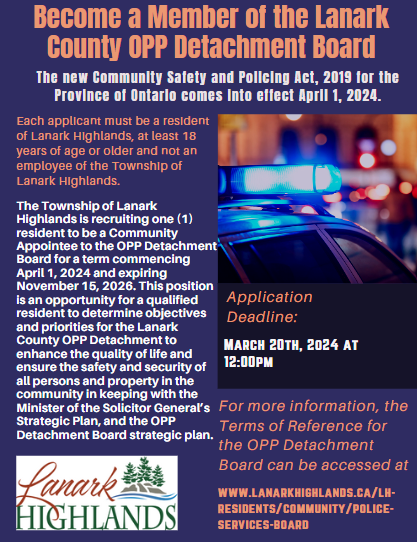Nicole Guthrie
NOTICE of PUBLIC MEETING TO CONSIDER A ZONING BY-LAW AMENDMENT - ZA-2024-03 MURRELL-KIRK HOLDINGS INC
File No.: ZA-2024-03 MURRELL-KIRK HOLDINGS INC
Subject Land: 1201 PENESHULA RD; DAR CON 9 CON 10 PT LOT 21 PT RD ALLOW RP 27R8933 PARTS 1 3 6 TO 8
Municipality: Township of Lanark Highlands
Owner: MURRELL-KIRK HOLDINGS INC
Applicant: MURRELL-KIRK HOLDINGS INC
TAKE NOTICE THAT, in accordance with the provisions of the Planning Act, R.S.O. 1990, as amended, this notice is to advise that sufficient information has been presented to deem the application being processed under File ZA-2024-03 as complete.
AND THAT the Council of the Corporation of the Township of Lanark Highlands will hold a IN PERSON MEETING as per procedural By-law on Tuesday, April 23rd, 2024 at 6:00 p.m. for the purpose of considering a proposed zoning by-law amendment under Section 34 of the Planning Act. If you would like to listen to the meeting, please dial 1-855-344-7722 or 613-244-1312 then enter Conference ID: 2883824. You can participate in person at the Municipal Complex, 75 George Street Lanark ON, to participate in the public meeting. In order to assist the Committee in its review of the proposal, you are requested to provide comments on or before April 15th, 2024 at 4:30pm.
PURPOSE AND EFFECT The purpose of the proposed Zoning By-Law Amendment is rezone the subject lands from Lakefrount Development (LD) to Commercial Residential (CR) and to permit 18 Full Service Recreational Vehicle Sites. There has been a history of confusion regarding the zoning of this property and this amendment is an attempt to clarify the zoning and to recognize the use of the lands for recreational vehicles. The development of the site will be subject to site plan control and will be on private services in accordance with required regulations.
IF A PERSON OR PUBLIC BODY would otherwise have an ability to appeal the decision of the Township of Lanark Highlands to the Ontario Land Tribunal but the person or public body does not make oral submissions at a public meeting or make written submissions to the Township of Lanark Highlands before the by-law is passed, the person or public body is not entitled to appeal the decision.
IF A PERSON OR PUBLIC BODY does not make oral submissions at a public meeting or makes written submissions to the Township of Lanark Highlands before the by-law is passed, the person or public body may not be added as a party to the hearing of an appeal before the Ontario Land Tribunal unless, in the opinion of the Tribunal, there are reasonable grounds to do so.
If you wish to be notified of the decision of the Township of Lanark Highlands on the proposed zoning by- law amendment, you must make a written request to the Township of Lanark Highlands.
ADDITIONAL INFORMATION regarding the proposed zoning by-law amendment will be available for public inspection at the Township of Lanark Highlands Municipal Office by appointment during regular business hours, Monday to Friday, from 9:00a.m. to 4:00p.m.
DATED at the Township of Lanark Highlands this 25th day of March 2024.
Amanda Noël, Dipl. M.M. T: 613-259-2398 or 1-800-239-4695 ext. 250
Clerk/Acting CAO F: 613-259-2291
Township of Lanark Highlands,75 George Street E:
Lanark, ON, K0G 1K0 W: www.lanarkhighlands.ca
NOTICE of PUBLIC MEETING TO CONSIDER A ZONING BY-LAW AMENDMENT - ZA-2024-02 MURRELL-KIRK HOLDINGS INC
File No.: ZA-2024-02 MURRELL-KIRK HOLDINGS INC
Subject Land: 100 CEDAR COVE RD; DARLING CON 9 AND 10 PT LOT 21 RP 26R808 PARTS 1 TO 5 RP 26R920 PT PARTS 1 AND 2 RP 26R1764 PART 1 RP 27R8933 PARTS 2 4 AND 5
Municipality: Township of Lanark Highlands
Owner: MURRELL-KIRK HOLDINGS INC
Applicant: MURRELL-KIRK HOLDINGS INC
TAKE NOTICE THAT, in accordance with the provisions of the Planning Act, R.S.O. 1990, as amended, this notice is to advise that sufficient information has been presented to deem the application being processed under File ZA-2024-02 as complete.
AND THAT the Council of the Corporation of the Township of Lanark Highlands will hold a IN PERSON MEETING as per procedural By-law on Tuesday, April 23rd, 2024 at 6:00 p.m. for the purpose of considering a proposed zoning by-law amendment under Section 34 of the Planning Act. If you would like to listen to the meeting, please dial 1-855-344-7722 or 613-244-1312 then enter Conference ID: 2883824. You can participate in person at the Municipal Complex, 75 George Street Lanark ON, to participate in the public meeting. In order to assist the Committee in its review of the proposal, you are requested to provide comments on or before April 15th, 2024 at 4:30pm.
PURPOSE AND EFFECT The purpose of the proposed Zoning By-Law Amendment is rezone the subject lands from Lakefrount Development (LD) to Commercial Residential – 1 (CR-1) and recognize 314 trailer campsites as promised by the Township in the 2006 Consent Applications.
IF A PERSON OR PUBLIC BODY would otherwise have an ability to appeal the decision of the Township of Lanark Highlands to the Ontario Land Tribunal but the person or public body does not make oral submissions at a public meeting or make written submissions to the Township of Lanark Highlands before the by-law is passed, the person or public body is not entitled to appeal the decision.
IF A PERSON OR PUBLIC BODY does not make oral submissions at a public meeting or makes written submissions to the Township of Lanark Highlands before the by-law is passed, the person or public body may not be added as a party to the hearing of an appeal before the Ontario Land Tribunal unless, in the opinion of the Tribunal, there are reasonable grounds to do so.
If you wish to be notified of the decision of the Township of Lanark Highlands on the proposed zoning by- law amendment, you must make a written request to the Township of Lanark Highlands.
ADDITIONAL INFORMATION regarding the proposed zoning by-law amendment will be available for public inspection at the Township of Lanark Highlands Municipal Office by appointment during regular business hours, Monday to Friday, from 9:00a.m. to 4:00p.m.
DATED at the Township of Lanark Highlands this 21st day of March 2024.
Amanda Noël, Dipl. M.M. T: 613-259-2398 or 1-800-239-4695 ext. 250
Clerk/Acting CAO F: 613-259-2291
Township of Lanark Highlands,75 George Street E:
Lanark, ON, K0G 1K0 W: www.lanarkhighlands.ca
NOTICE of PUBLIC MEETING TO CONSIDER A ZONING BY-LAW AMENDMENT - ZA-2023-06 Bissonnette
File No.: ZA-2023-06 Bissonnette
Subject Land: 1734 LANARK CONC 12 C; LANARK CON 12 W 1/2 LOT 18 PT LOT 19
Municipality: Township of Lanark Highlands
Owner: BISSONNETTE FRANCES
Applicant: BISSONNETTE FRANCES
TAKE NOTICE THAT, in accordance with the provisions of the Planning Act, R.S.O. 1990, as amended, this notice is to advise that sufficient information has been presented to deem the application being processed under File ZA-2023-06 as complete.
AND THAT the Council of the Corporation of the Township of Lanark Highlands will hold a IN PERSON MEETING as per procedural By-law on Tuesday, April 23rd, 2024 at 6:00 p.m. for the purpose of considering a proposed zoning by-law amendment under Section 34 of the Planning Act. If you would like to listen to the meeting, please dial 1-855-344-7722 or 613-244-1312 then enter Conference ID: 2883824. You can participate in person at the Municipal Complex, 75 George Street Lanark ON, to participate in the public meeting. In order to assist the Committee in its review of the proposal, you are requested to provide comments on or before April 15th, 2024 at 4:30pm.
PURPOSE AND EFFECT The purpose of the proposed Zoning By-Law Amendment is to rezone a portion of the subject lands within 120m of the Provincially Significant Wetlands (PSW) from Rural (RU) to Rural – exception– holding (RU-x-h) with an Exception for Tourist Establishment and a Holding Zone for Servicing reports. The rezoning is requested to place 7 cabins in a Tourist Establishment.
IF A PERSON OR PUBLIC BODY would otherwise have an ability to appeal the decision of the Township of Lanark Highlands to the Ontario Land Tribunal but the person or public body does not make oral submissions at a public meeting or make written submissions to the Township of Lanark Highlands before the by-law is passed, the person or public body is not entitled to appeal the decision.
IF A PERSON OR PUBLIC BODY does not make oral submissions at a public meeting or makes written submissions to the Township of Lanark Highlands before the by-law is passed, the person or public body may not be added as a party to the hearing of an appeal before the Ontario Land Tribunal unless, in the opinion of the Tribunal, there are reasonable grounds to do so.
If you wish to be notified of the decision of the Township of Lanark Highlands on the proposed zoning by- law amendment, you must make a written request to the Township of Lanark Highlands.
ADDITIONAL INFORMATION regarding the proposed zoning by-law amendment will be available for public inspection at the Township of Lanark Highlands Municipal Office by appointment during regular business hours, Monday to Friday, from 9:00a.m. to 4:00p.m.
DATED at the Township of Lanark Highlands this 21st day of March 2024.
Amanda Noël, Dipl. M.M. T: 613-259-2398 or 1-800-239-4695 ext. 250
Clerk/Acting CAO F: 613-259-2291
Township of Lanark Highlands,75 George Street E:
Lanark, ON, K0G 1K0 W: www.lanarkhighlands.ca
Make a difference: Become a Member of the Lanark County OPP Detachment Board.
Make a difference: Become a Member of the Lanark County OPP Detachment Board.

Virtual Public Education Sessions on Homelessness
Lanark County is hosting two virtual public education sessions on homelessness. Each session will contain the same information and is directed to the public, or people with little to no understanding of homelessness. Ian DeJong is a well-established expert in the field and strong/inspirational speaker.

2023 Community Service Awards



MUNICIPAL OFFICE FAMILY DAY HOURS 2024
Saturday Themed Skate Nights @ Lanark & District Community Centre.

Notice of Joint Public Meeting - OFFICIAL PLAN & ZONING BY-LAW AMENDMENT (OPA-06 & ZA-2023-06 Cooney Construction LTD._
TAKE NOTICE THAT, in accordance with the provisions of the Planning Act, R.S.O. 1990, as
amended, this notice is to advise that sufficient information has been presented to deem the
application being processed under Files OPA-06, ZA-2023-04 & SCOPA 15 as complete.
AND THAT the Council of the Corporation of the Township of Lanark Highlands will hold a IN
PERSON MEETING as per procedural By-law on Tuesday, February 13th, 2024, at 6:00 p.m. for the
purpose of considering a proposed zoning by-law amendment under Section 34 of the Planning Act. If
you would like to listen to the meeting, please dial 1-855-344-7722 or 613-244-1312 then enter
Conference ID: 2883824. You can participate in person at the Municipal Complex, 75 George Street
Lanark ON, to participate in the public meeting. In order to assist the Committee in its review of the
proposal, you are requested to provide comments on or before February 6th, 2024.
PROPOSED LANARK HIGHLANDS OFFICIAL PLAN AMENDMENT AND LANARK COUNTY
SUSTAINABLE OFFICIAL PLAN AMENDMENT FOR THE PROPOSAL OF A MINERAL
AGREGGATE PIT (OPA-06/SCOPA 15): The proposal is to re-designate part of the lands to permit an
Aggregate Extraction Operation (licensed pit) on a 50.6 ha parcel with the proposed amendment
affecting 23.02ha of the lands described as Concession 4, Part Lots 22 and 23 and RP 26R1662 Parts
11 and 13, geographic township of Darling, now in the Township of Lanark Highlands, municipally known
as 9665 Highway 511. The proposed Official Plan Amendment would authorize an Extraction Operation
(Pit). The 50.6ha parcel of land identified on the key map is presently designated as Rural Communities
- designated as Aggregate
Extraction Operation. In addition, an application has also been filed for an amendment to the Lanark
County Sustainable Communities Official Plan to re-designate existing Rural area lands to Mineral
Aggregate Operations as shown in Schedule A of the Official Plan. Lastly, the applicant has applied for
a Class A License under the Aggregate Resource Act to the Ministry of Natural Resources and Forestry.
PROPOSED ZONING BY-LAW AMENDMENT (ZA-2023-04): The proposed Zoning By-Law
Amendment will modify the zoning from Rural (RU) to Mineral Aggregate Resources Pit (MXP-x). The
nature of the rezoning requested is to permit the opening of a mineral aggregate pit. A key map
showing the location of the subject lands is shown on the reverse side and a copy of the application
is attached.
IF A PERSON OR PUBLIC BODY would otherwise have an ability to appeal the decision of the
Township of Lanark Highlands to the Ontario Land Tribunal but the person or public body does not
make oral submissions at a public meeting or make written submissions to the Township of Lanark
Highlands before the by-law is passed, the person or public body is not entitled to appeal the decision.
IF A PERSON OR PUBLIC BODY does not make oral submissions at a public meeting or makes
written submissions to the Township of Lanark Highlands before the by-law is passed, the person or
public body may not be added as a party to the hearing of an appeal before the Ontario Land Tribunal
unless, in the opinion of the Tribunal, there are reasonable grounds to do so.
If you wish to be notified of the decision of the Township of Lanark Highlands on the proposed zoning
by- law amendment, you must make a written request to the Township of Lanark Highlands.
ADDITIONAL INFORMATION regarding the proposed zoning by-law amendment will be available for
public inspection on at the Township of Lanark Highlands Municipal Office by appointment during
regular business hours, Monday to Friday, from 9:00a.m. to 4:00p.m.
DATED at the Township of Lanark Highlands this 15th day of January 2024.
Amanda Noël, Dipl. M.M. T: 613-259-2398 or 1-800-239-4695 ext. 250
Clerk / Acting CAO F: 613-259-2291
Township of Lanark Highlands,75 George Street E:
Lanark, ON, K0G 1K0 W: www.lanarkhighlands.ca
For more information, please visit: https://www.lanarkhighlands.ca/lh-business/planning/the-official-plan or https://www.lanarkcounty.ca/en/doing-business/planning-notices.aspx
NOTICE OF CANCELLED MEETINGS
Please be advised that the Committee of the Whole and Council meetings scheduled for
January 9th, 2024
have been cancelled due to insufficient business.
For further information please contact:
Amanda Noel, Clerk/Acting CAO
613-259-2398 x 231

75 George Street,
PO BOX 340
Lanark, Ontario
K0G 1K0
613-259-2398
1-800-239-4695
Hours of Operation:
Monday to Friday - 9:00 a.m. to 4:00 p.m.
